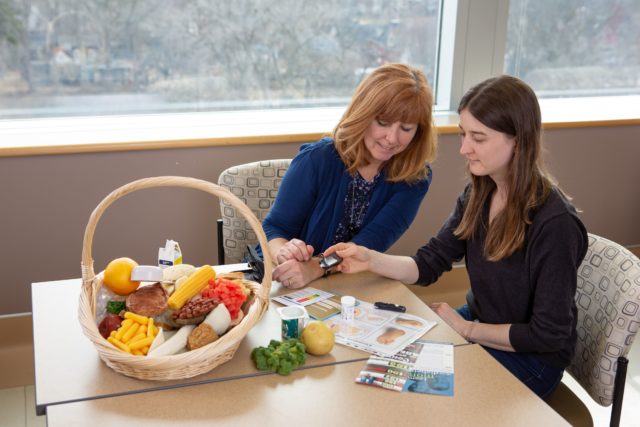A major milestone in the evolution of diabetes care in London began 50 years ago with two visionaries and a forward-thinking hospital led by the Sisters of St. Joseph.
Drs. Wilson Rodger and Gerald Tevaarwerk, physicians at St. Joseph’s Hospital, recognized that medical treatment was not enough to manage diabetes. Patients needed to take charge of their own health and be partners in their care.
At the time, St. Joseph’s was testing its wings as an academic hospital. There was zeal to explore new projects, new ways of caring for patients. Until then, “patients learned what they could from their family doctor, did what they were told and hoped for the best,” recalls Rodger.
But in 1970 when head nurse Fran O’Brien began began delivering lectures to diabetes patients inside a four-bed endocrine evaluation unit, the seeds for an education centre were planted.
“The hospital allowed the wheels to turn,” says Rodger.
The St. Joseph’s Hospital Diabetes Education Centre opened in 1973 with Rodger and Tevaarwerk leading the charge. It was initially funded through donations from London’s Lawson family, the local branch of the Canadian Diabetes Association, the hospital’s Medical Staff Association and the May Court Club.
Its first coordinator was nurse educator Dorothy Gibson, a pioneer in her own right. Gibson was the first person with insulin-dependent diabetes to be accepted into nursing, and she had a well-known motto: “The diabetic that knows the most, lives the longest.”
The Centre would grow quickly and eventually move to Mount St. Joseph to accommodate growing demand, which increased from an annual total of 402 patients in 1973 to 400 patients per month by 1989 the year the program moved.
Insulin pumps were introduced in the late 1970s, through a clinical trial headed by Rodger and Dr. John Dupre at London Health Sciences Centre’s University Hospital. They would have the first pump patients outside the United Kingdom, and play a key role in the evolution of the insulin pump as an effective treatment to reduce diabetes complications.
Subsequent advances in diabetes management have changed the care journey and quality of life for patients, but the opening of the Diabetes Education Centre (DEC) of St. Joseph’s Health Care London, as it is now known, remains one of the most significant milestones for London.
Today with 12,000 patient visits annually, the DEC, which returned to St. Joseph’s Hospital in 2008, boasts a dedicated team of 16 certified diabetes educators (eight nurses, seven dietitians and one pharmacist), as well as support staff.
The continuous advent a of diabetes technologies – insulin pumps, glucose meters and sensors – as well as new therapies and treatments, means learning remains a constant for diabetes educators and the people they serve.
“The Diabetes Education Centre is still at the forefront,” says Rodger. “The wheels are still turning.”
